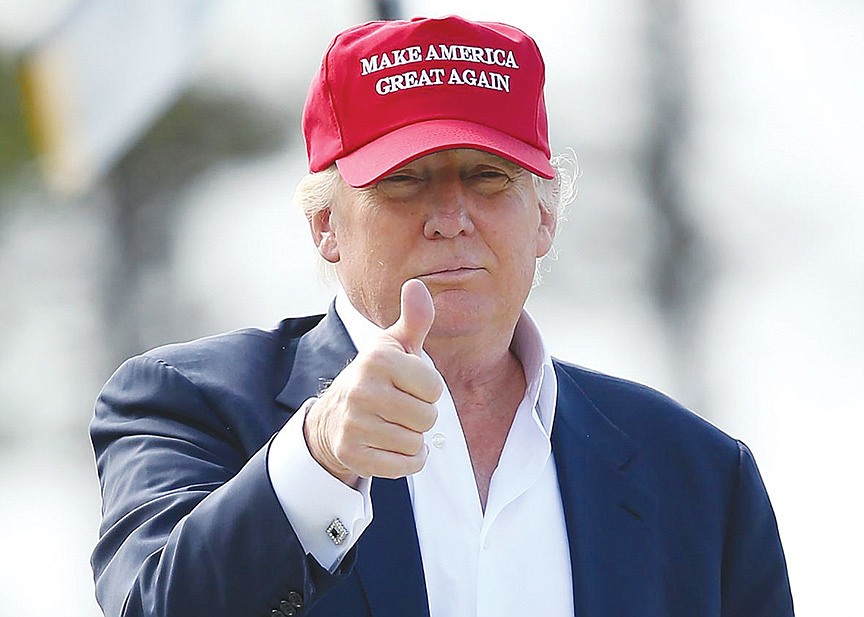- December 23, 2024
-
-
Loading

Loading

It’s probably pretty accurate to say roughly 60% of Florida Republicans who have not voted yet in the presidential primary are spinning — in fear, frustration and indecision. And roughly 60% of Republicans nationwide can’t believe what they are seeing:
Donald Trump leading the pack.
But it’s not just that. Think of the entire picture:
At the top of the Democratic Party, the leading candidates are Hillary Clinton, under serious investigation by the FBI and Justice Department and a proven deliberate liar to the American people and Benghazi victims’ families; and Bernie Sanders, an avowed socialist.
On the Republican side, there’s Trump, narcissistic, bombastic, flip-flopping, unpresidential boor; Ted Cruz and Marco Rubio, two freshmen senators, conservatives, yes, each gifted speakers, yes, who criticize the freshman senator holding the presidency, one who is despised by the very people with whom he would have to work, the other whose Senate attendance record was abysmal; and John Kasich, the candidate credited with acting most like an adult so far, with proven successful records in Congress and as governor of Ohio, and yet who rarely polls above 10%.
Out of 320 million Americans in the most amazing nation in history, it is staggeringly mystifying to think how Trump and Clinton — both beneath the dignity and integrity required of the office — have become the front-runners for the most important elected office in the world.
This is truly bizarre.
Mind you, let’s be clear: This is not to belittle the Trump supporters. We get it. They are rallying to execute the revolution against the Washington elected elite that so many Republicans (and Americans) desperately want. They’re rallying to bring about what they thought they were going to get twice — after the 2010 Tea Party victory, when Republicans took the House, and in 2014, when Republicans added their majority to the Senate.
What they wanted, of course, never occurred — a reversal and rout of everything Obama; an emasculation of the failed fiscal, social-welfare Leviathan; a holocaust of job-killing Washington regulations and taxation; and congressional officeholders who, finally, acted on the voters’ behalf instead of their crony funders and themselves.
As a result, millions have turned to the populist businessman who says exactly what’s on their minds, crass language and all — even though for four decades he has been a part of and beneficiary of the inside political elite they despise. He says what most of us believe: Washington is incompetent, and we do want someone to make America great again.
The character test
But if you’re among the 60% of the Republicans who so far have rejected Trump (this newspaper among them) and are ambivalent about the three remaining candidates — Cruz, Rubio and Kasich (this newspaper among them), for next week’s Florida primary here are considerations for your decision making. Ask yourself how each candidate (including Trump) has demonstrated:
These are all crucial, must-have characteristics for all of the candidates. So make your checklist. Who scores best? And remember the ultimate goal: winning the presidency, defeating Hillary Clinton.
All things considered: At long last, for the first time since Barry Goldwater, there is a Republican candidate who steadfastly embraces the constitution and its principles as our Founders envisioned: That is Cruz. Props to him for those principles.
But also remember the William F. Buckley Rule: “I’d be for the most right, viable candidate who could win.”
Now juxtapose the ultimate goal and the Buckley Rule against the requisite characteristics. Kasich is the one. Not Rubio. Not Cruz.
It’s all about the math
Unfortunately, next Tuesday’s primaries in Florida and Ohio are not about either character or the Buckley Rule if you’re choosing a candidate to stop Trump. It’s all about the math.
Florida and Ohio most likely will determine whether Trump can win the required 1,237 delegates to become the nominee. Florida has 99 winner-take-all delegates at stake; Ohio has 66. If Trump wins both states, momentum pushes the possibility increasingly in his favor.
But in Florida, there is only one candidate who can beat Trump: Rubio. Cruz can’t. But his strategy is not to win here. It’s to finish second, giving Trump all 99 Florida delegates, forcing Rubio to drop out and hoping that Rubio supporters throughout the remainder of the primaries would coalesce behind him.
Yet even that is not a likely path for a Cruz nomination. Not counting this Tuesday’s results (after our press time), Cruz would have to win 75% of the delegates in the remainder of the primaries to win the nomination. Trump would need 48%.
On the other hand, Rubio and Kasich victories in Florida and Ohio, respectively, likely assure a brokered convention this summer in Cleveland. That, of course, will be as messy and ugly as the campaign so far has been bizarre. And it will become the penultimate test: Who among the candidates and their supporters will be willing to do what’s honorable and right for the Republican Party and the country and for what will be ultimate test: Win the White House.
Based on that goal, in polling so far of who is most likely to defeat Clinton, Kasich would win by the largest margin, followed by Rubio, then Cruz. Trump would lose.
For Tuesday’s primary, for the sake of the ultimate goal, we recommend: Marco Rubio.
(Postscript: On the Democratic side, no surprise, we cannot recommend either candidate. Regular readers of this page expected that.)